Chapter 22 WIDENING HORIZONS
Cecily and I and some of our friends were going to stay at Binna Burra Guest House at Lamington National Park on the NSW Queensland border, everyone travelling by different means according to their incomes and vacation dates. I went by train to Brisbane and there at the station George was waiting for me. We had met at tennis when I had lived at Pennant Hills. His parents had left Austria before the war and his father had died a few months before my mother. We had many interests in common and both had a recent loss.
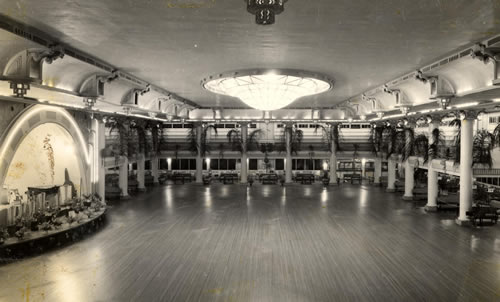
He took me to dinner in Brisbane, to a concert conducted by Joseph Post in Brisbane City Hall and then on an "alpine railway" to Cloudland Ballroom, built on a hill with large windows overlooking the lights of Brisbane and a special "sprung" floor, believed to be the best and grandest in Australia. The interior was elaborately decorated but I found the city lights more impressive. George was a good dancer and was very thoughtful and sensitive. It was a beautiful evening. The next day George took me to look at the Oasis Swimming Centre, to Mt Coot-tha, to an open-air concert in the Botanic Gardens and finally on a Show Boat on the river. He was such good company and so considerate.
Cecily arrived by plane and we three left by bus for Binna Burra, to join some of the other walkers. This is an ideal place for anyone interested in the outdoors, in serious walking or casual strolling. Accommodation varies from cabins to more upmarket. Some of our group was camping, we were staying in moderate-priced cabins, using communal showers and toilets, going to the dining room for hearty meals. I had been there camping before, carrying what we needed in backpacks, cooking on an open fire and had grown to love the scenery.
Restless and confused I went on all the hardest walks with the seasoned walkers, leaving Cecily and George to join the more sedate holiday-makers. John was torn between the exciting longer walks and the easier ones. He managed a fair combination and sometimes we induced Cecily and George to join us. In the evenings we played cards for matches (I still owe George four matches) or danced on the rough floor to some scratchy old records or went on walks to find glow-worms.
Three of us walked to O'Reillys' Guest House on the other side of the plateau going via Canungra Gorge and Bull Ant Spur, 26 miles with no real track and very steep hills to climb. When we arrived we signed the guest book, having achieved an endurance feat. Next day we walked back to Binna Burra by the easier, shorter graded track.
One day on the way back to the guest house after a walk, three of us found ourselves walking faster and faster in an unofficial race. We did the last mile in eleven minutes, running the last pinch uphill to the guest house and collapsing in the dining room. Why? Why ever should I exhaust myself trying to race two chaps, bigger, stronger and fitter than I? Perhaps to keep up such a torrent of activity that I had no energy left to think.
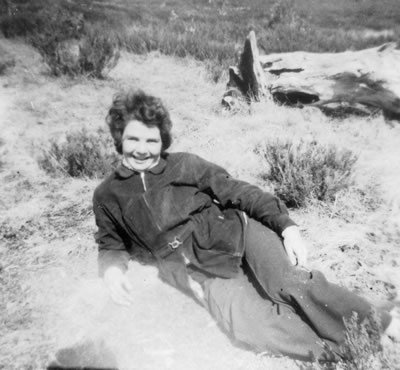
I put to the back of my mind the loss of my mother, whom I had really been losing for ten years. She had not wanted an elaborate funeral service or any headstone in keeping with her beliefs. Not having been brought up with a notion of heaven I knew she no longer existed, but this was an enigma and unfathomable. Her siblings could not accept this. Their dear and long-suffering sister had gone to her reward. I knew her body was buried, but where was her personality? her mind? There was always a moment after something happened which would interest her when I thought "I must remember to tell Mum that", then the sudden awareness that I would never again be able to tell her anything, nor ask her anything. She could no longer share my life even as an interested observer.
Cecily, always encouraging, was one of my main sources of reassurance and comfort in this period of adjustment to the gap left by the death of my mother.
Ron rang me as soon as I got back to Sydney to say that he was on his way over to see me. I had hardly given him a thought for the last couple of weeks. He knew that I went out with other people especially those that danced, but still seemed to think I was his "steady", although there was no physical intimacy between us. As it had been too diverting during the holidays and I felt uncomfortable that I had enjoyed the attention I had received, I told him that I didn't want to go steady with him. He seemed to be interested only in caving and photography. But had I done the right thing? I wanted to go to a ball and now had no-one to be my partner. It was certainly better to have someone than nobody and soon I began to regret having no "steady", so I rang Ron and asked him to take me to the ball, although he assured me he still would not dance. He arrived at 8.40 instead of eight o'clock and would not be dragged up all evening. Still I had most of the dances. This was definitely a problem. Also his smoking, although it never occurred to me that it was anyone's business but his own. We were aware that it was not healthy. Our friendship was declining and I went out more and more with other people who had wider interests and who danced.
Towards the end of the year, one of the boys in my class brought a cicada to class in his pocket. All was well until he yielded to temptation and put it on the back of the child in front. It began to chirp loudly at an inappropriate moment, creating a great diversion and had to be banished to the playground, although there was nowhere suitable to put it.
There was a very time-consuming test for every class. My Transition had to do the same test as First Class and in spite of their age (or lack of it) they did very well. They were mostly interested in what I gave them to do and listened to me as I explained things. Their curiosity and eagerness to learn were more important than test results.
"Don't worry," I tried to encourage them. "We're not up to a lot of these questions yet. You'll learn this next year." I wanted to emphasise their achievements rather than the gaps. Classes were allocated for next year with the older teachers having first choice, ex-students got what was left. The Deputy chose 2A, I would have a lower First Class.
Most of the children brought a gift for the teacher, sometimes flowers, often handkerchiefs which were very useful, sometimes embroidered by the mothers or grandmothers, sometimes bottles of inexpensive perfume, sometimes powder or bath salts, one brought "stick-jaw" toffee. Most appreciated were bone china cups and saucers in pretty patterns which I put aside for my "box". Bone china was a white porcelain with a bone ash (calcium phosphate) content. For my friends I made simple gifts.
I had finished Bill's blue jumper, although I was beginning to wonder if he was going to grow faster than I could knit. I took it to him, visiting the people I had lived with at Lugarno, Helen, Alan and their son Philip, now a young teenager. Helen, speaking of my father said she was expecting them to call. "Who's 'them' ?" I asked.
"Don't tell me you haven't been told!"
Dad had remarried, his new wife was Dot who had kept house for Dad, Bill, her mother and brother at Peakhurst for many years and must of course have known Dad well, but she apparently preferred to be married to him, rather than spend the rest of her life as a spinster. Dot's mother had died, her brother Vern had gone to Tasmania. I was surprised and Helen seemed to think I might have been upset but I thought it was entirely up to Dad and Dot, not my problem.
When Dad and Dot arrived at Lugarno they told me they were living in a house belonging to his sister-in-law, my Aunt Marion, painting the house in lieu of rent.
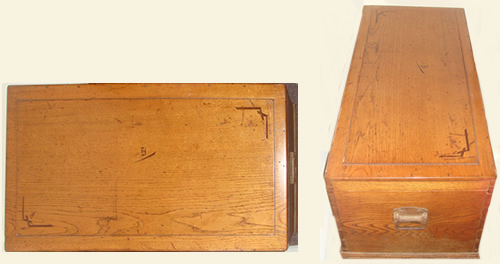
The glory box made from Siberian Oak
I said to Dad:
"You know the glory box you made for Mum? Well I have lost the key and wondered how to open it. I don't want to ruin it. There are towels and some things in it I could use. I have also been given a few presents which I will put away - some lovely bone china cups and saucers from the children at the end of the year."
"I'll collect it and see what I can do. I dare say it needs polishing again and if you like I could put your initials in the lid."
"That seems a lot of trouble. I don't mind Mum's initials in it. I hope you can open it, that's the main thing. There used to be some wool in it and linen I could use."
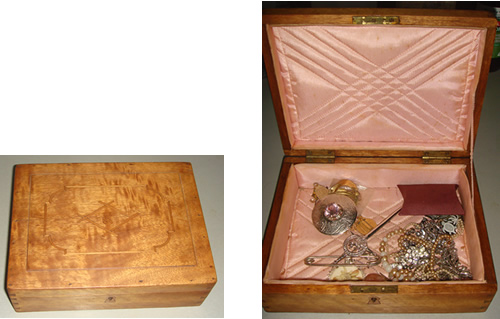
The matching jewerly box
When I visited Dad and Dot later I found out that Dad decided to paint the house quite meticulously, all cornices in different colours, very tastefully done, but not what was arranged and expected and took a great deal longer. I knew Dot had to go along with Dad's wishes. Once when I was there he told me something about his ancestry and showed me a painting of a vessel built by his great grandfather. He also had a sword and swordstick holder, a family heirloom. One was to be for me, one for Bill. At the time I wasn't interested in either. The swordstick and holder went to a museum on loan and the painting was put behind a cupboard.
They said Bill was uncommunicative to them and they asked me how he was going, as he usually opened up more to me. It was a pity that he lived so far away. Now that he had a motorbike he came fairly often for dinner or to take me out for a run.
I frequently visited Auntie Dorrie and Uncle Perce and sometimes went on outings with them.
Uncle Perce still had his coaching college and wrote text books. He had said he felt the need of more exercise. He had noticed that Christmas Bush [Ceratopetalum gumniferum] sells well in Martin Place at Christmas. So he had bought land at Dundas, build a small cottage and grew Christmas Bush for the markets. The cottage consisted of a dining-room, one bedroom and a large living area, a bathroom and a little kitchen overlooking the two or three acres of very young trees.
Uncle Eric, the next child after my mother, had been a mechanic in his younger days, had two boys by his first marriage and had remarried about ten years ago. He then decided to become an accountant, working during the day and studying further courses at night. He and his second wife spent a few years in Edinburgh, her home town. On their return to Australia, Uncle Eric and Auntie Peggy lived in the cottage at Dundas.
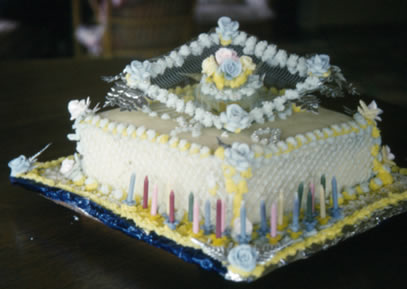
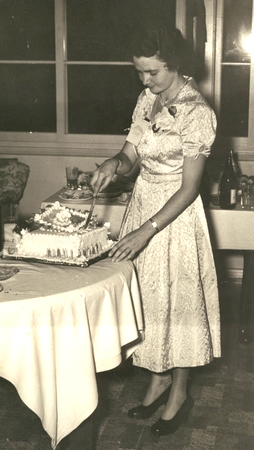
In the New Year my two uncles and their wives planned to have a 21st birthday party for me in the cottage. I had attended a lot of parties for my friends, mostly held at home, with the carpets (if any) rolled up for dancing, games and home-cooked cakes for supper. Betty organised games and activities. Auntie Dorrie made delicious cakes for supper, Auntie Clytie, just before going to Rabaul, made a fruit cake, with original decorations. She had learnt cooking years before and usually made cakes for extra money and as a gift for friends and family. Family closeness and support continued. I paid a dressmaker to make me a special dress for the occasion, but decided I really could have done it as well myself. It was a pretty, silvery material and I wore it with a pink artificial flower on the shoulder.
My brother and some of my cousins, colleagues and bushwalking friends were at the party, bringing gifts, mainly jewellery. I was presented with the traditional "key of the door" and the usual songs were sung.
I was now eligible to vote but had no allegiance to any political party. My birthday nearly coincided with the visit by the Queen. Most people went to town, waited for hours with large crowds to see her majesty, young, slim and beautiful, when she arrived in Sydney. We then went to the city to see the wonderful decorations, saw the Queen again later in Macquarie St and stayed until dark to see the lights. This was royal theatre for everyone.
When the next elections were held I voted independent hoping that I was supporting someone I could agree with. People tended to keep their voting patterns private and we rarely discussed politics. My friends and I certainly did not think that politicians or the government (taxpayers) should support us or that we should be dependent on them. We could all manage our lives and felt we should do so.
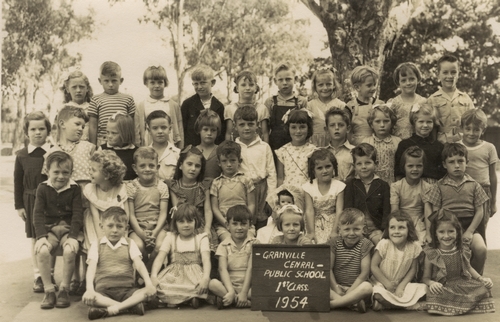
1st Class
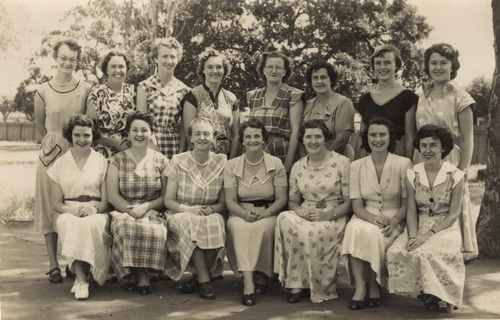
Teachers: Miss Kinny far left seated
My class as expected was First Class, with some of the children from last year, whose names I already knew, my extra job was Federation Representative for the Infants' School so when a meeting was called I felt I must attend, but was dismayed that the whole atmosphere was antagonistic to the Department of Education. Union members gave the impression that their job was to fight for their own priorities, mainly more money. They seemed to be looking for someone to blame for everything and the Department of Education was convenient. After that I simply put the information on the notice board. Most of the teachers said the Federation was a militant group but I gained the impression that many of them favoured the Labor Party because it promised to look after its supporters, whereas the Liberal Party tended to encourage capable people to look after themselves. When a march was organised I did not go. I became even more sceptical of strikes than I had been. It seemed to me that higher wages led to higher costs and higher taxes, and back to strikes for more money,the famous spiral.
I was now living at Homebush in a house with two other girls sharing the facilities with the owners but the landlady wanted no inconvenience, so we had to eat during certain times, do our washing and ironing on certain days, rain, hail or shine. There was no flexibility or negotiation. This would not last long for me.
Uncle Perce and Auntie Dorrie sailed for England and I went to the ship to see them off. I left Homebush in pouring rain and was waiting at the bus stop when a middle-aged couple offered me a lift to Burwood station. When they stopped at Burwood shops to buy flowers I decided to buy some too. They then said "We are going in to the city if you are going that way." I accepted. Nearing the city they said they were going to see a ship off to England. I said I was too. They were going to the very same ship!
Following an afternoon of table tennis at Cecily's at Pennant Hills we walked to the pictures at Thornleigh to see "The Conquest of Everest" which stirred our admiration and fired our visions to do things within our abilities, now even more than previously. I remembered the event almost exactly a year earlier and how hard it was to understand the kind of difficulties the climbers encountered as we had never learnt rock climbing at that altitude. Photos taken by Ron of some of us in front of Bungonia Caves also of him and other friends practising rock climbing were published in the Women's Weekly with a reference to the climbing of Everest. Apparently Ron had gone on from caving to further uses of the skills he had acquired underground. The nearest I had got to rock climbing was climbing Pigeon House near Ulladulla in April. But I had met a lot of these people at Bushwalkers' Balls and the reunions and so was very interested. It was rare to have one's photo published.
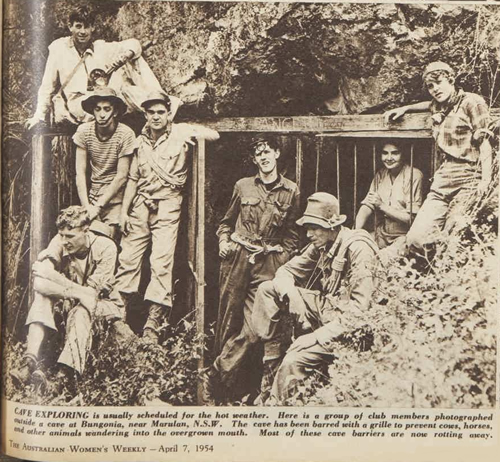
In May I moved to Burwood to a more attractive and slightly larger and dearer "digs", a "bed-sitter", a room with a bed, wardrobe, easy chair, a desk and chair. There was a telephone on which we could get incoming calls and make outgoing calls with the consent of the landlady who kept the telephone in her room. The kitchen and bathroom were shared by four women.
Dad repaired and repolished Mum's Glory Box and brought it over in his truck and helped me to move. At the time Bill was working for Uncle Allan's engineering firm which made tiny components for aircraft and carburettors in cars.
After using blankets or a sleeping bag borrowed from the club I was at last able to buy a sleeping bag of my own in time for a walk from Katoomba, along Narrow Neck, across the Cox River in freezing weather. I was now saving for a wind jacket. The new president of the Kameruka Bushwalking Club was a newcomer, another Bob, who swept us all off our feet. He was well-built, a great walker, good-looking and with a twinkling smile and pleasant, unassuming, easy manners. He was an immediate hit with everyone. When he asked me to go to a party with him I was delighted and enjoyed myself, but hesitated to pin too much hope on a single invitation.
"We must do it again," said Bob as he ran me home in his father's car.
The following evening he rang to ask my opinion about the number of people we could fit into the truck on the forthcoming weekend trip. It flattered me enormously to think that anyone would consider asking my advise about such matters. We chattered for ages until the landlady came out of her room and remarked she was expecting a call, so I had to conclude our conversation.
On Wednesday just as I was arriving home from work, Bob was driving down the road in his father's car.
"Coming to the Rucksack Club meeting?" he asked "I thought you might like a lift."
"Meeting? Oh that's next week. Are you going to join the Rucksack Club too? Most of us belong to both. It gives you more choice."
"I thought I'd see what it's like anyway. You like it, don't you? Would you like to come for a cup of coffee now? There must be a cafe somewhere?"
"That would be very nice. Sorry I can't invite you in. We can't have males in the house, except brothers. My brother sometimes comes and brings his girlfriend on his bike. Or I can arrange to use the kitchen for visitors occasionally."
"Do you find it lonely? Such an impersonal home?"
"Yes but I'm not home very much. It's better than my last place where we had to cook and do our washing by the clock. I'm always finding things to do to keep busy. Sometimes I hardly have time for my schoolwork."
"I'm so glad to live at home. My four young sisters bother me sometimes but mostly we get on well together and there's always someone around. They're great really. Up until about a year ago most of my social activities were escorting them to things they wanted to go to. I met lots of people."
"I think it would be great to have an older brother."
"Yes it suits me too to have younger sisters. I can go out with them when I feel like it, without getting involved. Girls scare me a bit when they try to rush me." I made a careful mental note.
I was flattered that he seemed to be comfortable with me, probably because I was not "pushy".
John and Cecily were going to a ball and suggested I ask someone to take me. It was something I didn't like doing, but of course I was keen to go to the ball and under pressure from Cecily I tried to think - whom should I ask? Harry? George? both of whom I saw frequently at concerts and other occasions or Bob? The one thing I wanted to avoid was to have any of them think I was "after" him. So at tennis on Saturday, I casually mentioned to George about the ball and he eagerly agreed to take me.
"What colour is your ball gown?"
"Gold." This was for ordering a corsage, frequently orchids, an accepted part of a big occasion. The evening was a great success. George drove us all in a borrowed car.
George came to see me the next afternoon to show me his photos of Lamington. He asked me to go to see the film "Moulin Rouge" on Friday and to dinner at one of the best restaurants, chequers, which stayed open very late, so doubled as a respectable Night Club. George was as usual punctual, attentive, considerate and accustomed to the correct etiquette. I wore a pretty aqua frock I had made, with a pink artificial flower pinned on the shoulder. The film was well done, about an artist, Henri Toulouse-Lautrec, who was deformed as a result of broken bones as a boy, but who became famous about 1890 as a painter of Parisian nightlife, especially at a cabaret, The Moulin Rouge, known for the lively dance, the cancan by Offenbach. George and I ate and danced and talked until one am and the next morning a beautiful sheath of flowers arrived for me - violets, carnations, gladioli. I felt like a celebrity. When I rang George to thank him for the flowers he invited me to lunch. From then on we were going steady for several months. I was often invited for meals and sometimes stayed overnight at his home. His mother's speciality was Wiener schnitzel and I later made an attempt at them myself. This was my first close encounter with another culture, Austrian, by now ten years after they had come to Australia.
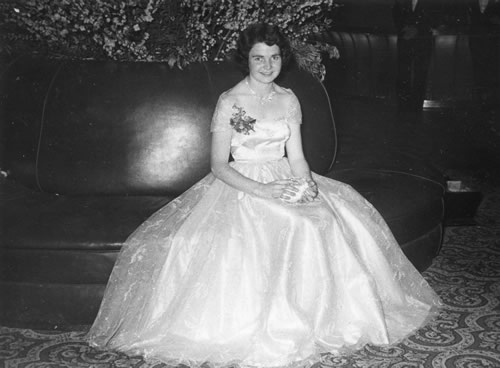
But not being sure of myself I didn't give up my other activities, still went bushwalking and caving.
After another weekend at Pennant Hills, Cecily and I were going to work when she told me she and John were getting engaged the next Saturday. She asked me to be her bridesmaid when they married. Being a bridesmaid was important to girls. It was traditional for the bride to ask her sisters, if there were no sisters, then "best friends". So far I had missed out. My friend Beverlee, now living in Queensland had married and had asked me to be her bridesmaid but I had not been able to do so.
I began to knit a pale green bed-jacket for Cecily's "box". As soon as that was finished I began a blue jumper for George. Every payday Cecily bought things for her "box" and had an extensive collection of bath towels as she bought a pair as often as possible. Like most girls of our age at the time, she sewed and knitted for her trousseau. We were often both occupied with embroidery. I made a supper cloth with embroidery of carnations. A supper cloth was a special cloth used instead of an ordinary table cloth for a special afternoon tea or supper.
Sometimes when George and I went out with Cecily and John, John made jokes about "John BC" (Before Cecily) and "George AD" (After Dorothy), suggesting he and George were influenced by us girls to be more refined and gentlemanly.
At this time the average couple when engaged planned to buy a block of land, sometimes live in a borrowed caravan, a shed or garage while saving for the house. Sometimes they built part of the house. The girl would plan to work for two or three years of marriage if possible but contraception was far from reliable.
Our friends were getting married and we were often invited to the weddings. These were as large as the family could afford. The girls had new frocks if possible, or they borrowed or hired. The boys usually hired suits. As these were special occasions there was sometimes champagne. Some of the boys developed a taste for beer on a hot day. Girls were offered lemonade which I did not care for. I discovered lemon squash and pineapple juice which I much preferred. Fresh orange juice was becoming available at some outlets. But I still felt a bit wary of alcohol.
On one occasion Bill planned to bring his girlfriend to visit so I also invited George. In my new "digs" I could invite friends to dinner occasionally provided I arranged it first with the other three tenants. This time I cooked a round roast. Just as I was about to serve, I was called to the phone.
"Could you carve the roast for me?" I asked.
When I had finished on the phone, I came back to find that my visitors had served the dinner. The roast had been cut into four segments, like pie.
"Is that an Austrian fashion?" I asked. Apparently the three of them had had a hand in it.
I no longer had my mother to worry about and would be more free to travel if I chose when my three-year bond was over at the end of another year. I had saved some money towards a trip to Europe or a home of my own and at George's suggestion I invested some of it in shares. As I knew nothing about such matters I took his broker's recommendation and gave him £92 to invest. The broker chose a Credit Union. I was a bit surprised as this concept was quite new to me and seemed dubious. Debt had somehow become "credit". People could borrow from a credit union for any goal, frivolous or overambitious and they could easily get themselves into trouble with the repayments. Most people borrowed money from a bank to buy a house, after establishing credit and saving a deposit, or borrowed short-term from close friends and relatives, other than that they saved for what they wanted. With more government benefits, pensions, education scholarships, hospitals, transport concessions, people came to be less prepared to save and wait, more reliant on welfare. It was still not easy for the unfortunate or unorganised who needed the support of friends and family which began to decline as the conviction grew, that it had become the government's (taxpayers') responsibility. People began to reduce their sense of self reliance and their obligation to the community began to decline. I tended to think that people should be responsible for themselves unless they were not capable.
George and I and a group of friends were going to Kiandra to a ski Lodge. I bought a maroon wind jacket, made a pair of matching gabardine slacks, and knitted a blue jumper with white "snow flakes" in a Fair Isle pattern across the yoke, on the cap and mittens. The snow was very patchy and during the time I did not become at all proficient as a skier but I did enjoy another new experience. We spent a lot of time playing cards and watching the barometer, willing it to drop, so that more snow would fall, enough to be ski-able. The different geology from the Blue Mountains was noticeable and I thought I needed to understand it a bit more.
George and I often went to parties held in the homes of mature and sophisticated people who belonged to the Ngunnigan Club. The club had originated with a group of Austrians with a rich and cultural inheritance who were also nature lovers. Sometimes serious music was played and I met artistic and musical people from a different world. One party was in a stunning (but not palatial) house in Vaucluse, which belonged to Rhona and Bruce Pratt (she had formerly been Pixie O'Harris from Wales whose story illustrations I had known for many years). Their children were about my age and for them a voyage overseas was a normal part of growing up. Two of their daughters, Halcyon and Robyn (who had been a contributor to our school magazine in the late 40s) planned to sail in a couple of years. Her nephew Rolf Harris, was furthering his career in England. We played Charades, acting titles of books, plays or films, guided by our vivacious hostess. My horizons expanded considerably.
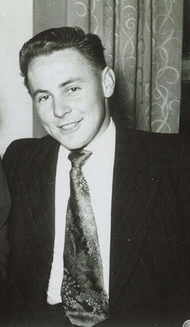
One day during the Christmas holidays I heard on the radio about Bob, who had gone to the Reserve in Tasmania with some of our friends. He was taking photographs near a waterfall, slipped and hit his head on a rock, fell into a pool and failed to surface. I clearly remembered that area near Du Cane Hut. He was pulled out but could not be revived. There followed a terrible ordeal for those who had to bring his body out on a makeshift stretcher to the nearest civilisation, two days walk away and go through gruelling police questioning. It was a great loss to our club, to each of us personally and especially to the family who had lost their only son and brother.
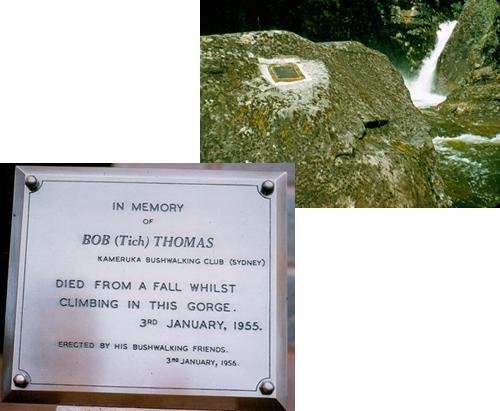
Bob Thomas plaque at Boulder Falls, Cradle Mt. Lake and St. Clair Reserve,
Tasmania, Jan 1956. Photo by Brian Petrie
The death of a young vital man with heaps of potential before he had a chance to do anything with his life depressed us all. The thought was most subduing. It got to me more than the death of my mother the previous year. It could have been me. And if I had asked him to take me to the ball a few months earlier, he could have been my "steady". My friendship with George had begun to fade, he was not flamboyant enough and I was still pretty "mixed up", couldn't be sure what I wanted, was rather too wrapped in my own problems to appreciate him, because he was not exactly the tall bronzed lifesaver (or bushwalker) type. I didn't really have any idea of what qualities were desirable in men, so long as they weren't "fast", didn't drink to excess and could dance. I put more importance on physique than personality. One friend whose company I enjoyed I dismissed as a possible "steady" because he had big ears.
But the encouragement and attention of my relatives, my girlfriends and their families, my interesting life as a teacher of young children, the invitations from the young men I knew, the reputation I had gained of being a "good" walker and a good sport, all combined to help me develop confidence in myself, to see myself as a competent person, as a success in what I undertook. My self-esteem was growing. I saw myself as ready to settle down if only I could meet the right person. The "right" person of my imagination now had a marked resemblance to Bob.
* * *
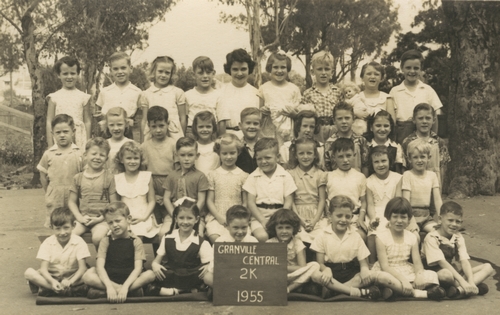
2nd Class
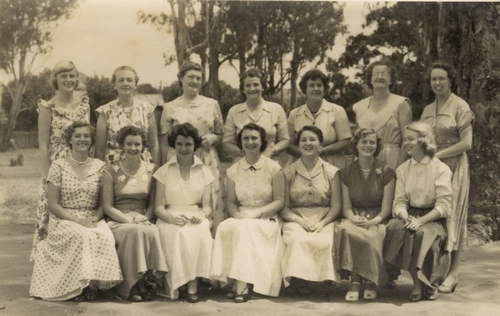
Teachers: Miss Kinny 3rd from left seated
My class was 2K, (after my initials) as an experiment in not labelling classes "A" or "E" according to their perceived ability at the time from the test at the end of last year and were considered to be "slow learners". I knew that really my class was 2E in disguise. Some of the children I had already taught in Transition and First Class. They would need all my developing skills to engage them to enjoy their work.
One of my colleagues married one of the primary school teachers while, aged twenty-one she was still under bond and could not afford to resign. She exuded confidence in herself and her relationship. They had an intense and turbulent relationship and a few months later she went on maternity leave. I knitted her a layette, coat, dress, bonnet and bootees. The Department of Education was more flexible in the case than I had realised. After the birth she arranged for a baby-sitter near the school to care for her son and at lunch time she went to feed him, having done other playground duties. It was unusual at the time and I felt not ideal for mother or baby or the school. She was "over the moon".
NEXT >>



 The glory box made from Siberian Oak
The glory box made from Siberian Oak The matching jewerly box
The matching jewerly box

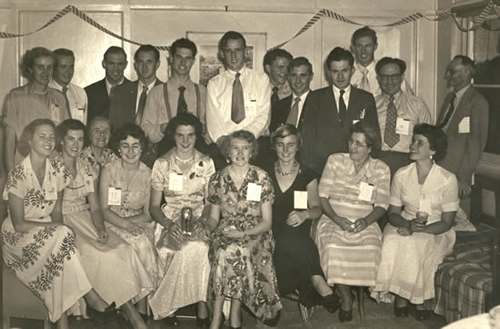
 1st Class
1st Class Teachers: Miss Kinny far left seated
Teachers: Miss Kinny far left seated 
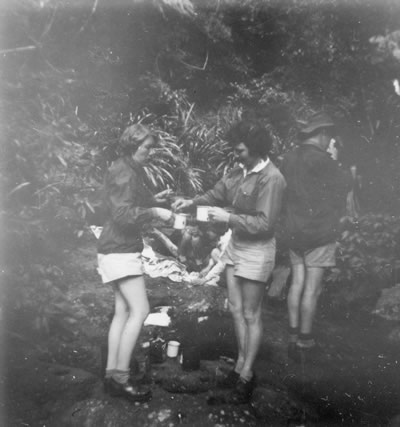
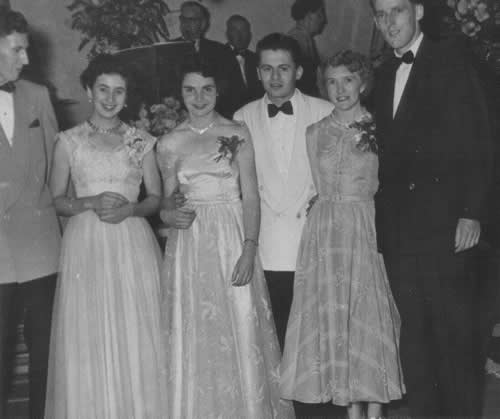

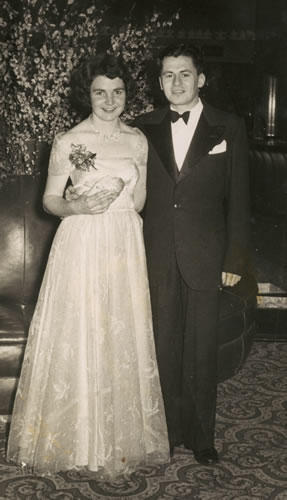

 Bob Thomas plaque at Boulder Falls, Cradle Mt. Lake and St. Clair Reserve,
Bob Thomas plaque at Boulder Falls, Cradle Mt. Lake and St. Clair Reserve,  2nd Class
2nd Class Teachers: Miss Kinny 3rd from left seated
Teachers: Miss Kinny 3rd from left seated



